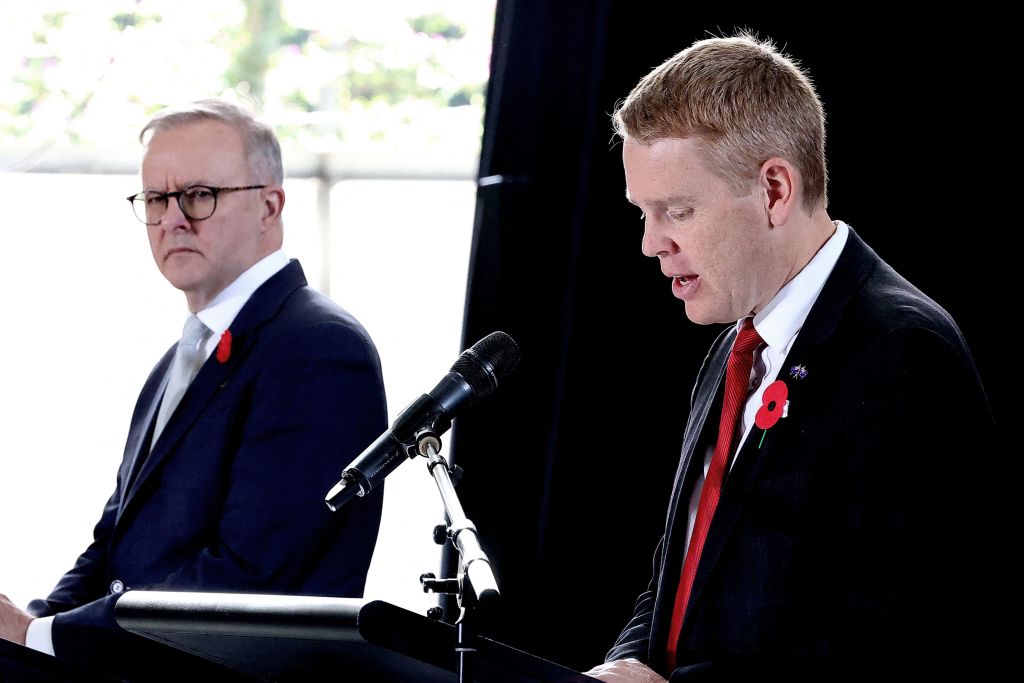A rare thing is happening in New Zealand – an actual debate over foreign policy. Specifically, over whether Wellington should join what is known as Pillar II of AUKUS, which involves sharing high and emerging technologies. The prospect was first put on the table publicly following meeting with senior Biden administration official Kurt Campbell, and Defence Minister Andrew Little said New Zealand was “willing to explore it”. The offer took some by surprise but past tensions over Wellington’s stance on nuclear ships (in 1987 New Zealand banned nuclear weapons and propulsion from its territory, leading Washington to suspend its ANZUS treaty obligations to the country) appear to be mended.
Yet the debate, so far, has been fairly one sided. Most political commentators, activists, former prime ministers, and opposition politicians are arguing that New Zealand should have nothing to do with AUKUS. In my view, there is a strategic case for New Zealand joining Pillar II – indeed, this presents a massive opportunity and many critiques are overblown.
But why should Australia care? What can New Zealand offer? There are four factors worth consideration.
The first is that New Zealand’s entry would establish a collaborative NZ-Australia framework on high-technologies. At present, there is no high-tech industrial infrastructure with military capacities in New Zealand that AUKUS can slot into. Yet New Zealand’s existing high-tech resources can be harnessed and AUKUS would be instrumental in their development. In turn, this would allow New Zealandto feedback into AUKUS in a meaningful way.
Additionally, New Zealand has many experts in various fields that, by virtue of being in New Zealand (far from much of the world) tend to think outside the box. The country has many innovators that, with the right investment and focus, can offer novel solutions and do so at considerably lower cost relative to most Western countries. Indeed, NZ companies, such as Rocket Labs, are already well-known and work with the US Space Force. Less known companies include Starboard that focuses on using AI for tracking illegal fishing vessels. Another company, X-craft, uses AI in their seacraft for a variety of tasks, from navigation to object detection and response command hierarchies. In short – there is expertise in New Zealand in rocketry, wireless power transmission, underwater sensors, hydrophones, data storage technologies, etc.
As such, New Zealand can contribute expertise to the present and future tech programs in AUKUS nations and offer niche manufacturing and testing.
The second reason is that the New Zealand Defence Force (NZDF) remains a professional one. It’s regular forces stand at approximately 9,200 personnel, making it about 1/6th the size of the Australian Defence Force, which maintains 59,304 regular forces. A review of Defence is currently underway in New Zealand, set for completion next year. The Labour government seems to understand there is a need to increase defence spending in coming years, while the recent 2021 Defence Assessment and the new Prime Minister Chris Hipkins are “clear-eyed” about the changing geopolitics in the Indo-Pacific.

There are rumours New Zealand will bring back its air-strike capabilities. As such, the days of tailoring the NZDF for peacekeeping operations appear to be ending, a fact reinforced by New Zealand’s acquisition of 4 P-8 Poseidon. This shift is one that complements ADF priorities but, for the NZDF to remain interoperable with the Australian military in the future, it needs to secure access to Pillar II technologies. Without this, New Zealand’s military doctrine will fall out of step and it will literally not be able to keep up in the field and/or communicate using allied communication channels. New Zealand will be unable to contribute in meaningful ways and its forces will become a liability in joint contingencies, whether they are of a military nature, in response to humanitarian emergencies or natural disasters across Oceania – including in Australia itself.
Fourthly, without joining Pillar II, New Zealand’s broader strategic, security, and intelligence ties with Australia and the AUKUS partners will atrophy. New Zealand’s diplomats and intelligence agencies engagement with Five Eyes intelligence sharing mechanisms will also not be able to access and share intelligence. Ultimately, New Zealand may be pushed out, leading to gaps in the network.
Finally, with China’s rapid and profound military rise the broader Indo-Pacific balance of power in the region is changing. As it does the prospects of interstate war are increasing since, generally, as a state’s relative military power grows, so too does its prospects of successfully conducting military operations.
AUKUS is about increasing the costs and risks to China of using its military forces. It’s about deterrence. New Zealand has no illusions, understanding that it is a small power in the Indo-Pacific balance. Nonetheless, it can add its weight to collective efforts to deter conflict and maintain peace and security in the region. In being allied to Australia and obligated to come to Canberra’s defence in the event of conflict, it makes immanent sense that the NZDF is prepared for such an eventuality to the greatest extent possible. Having access to the technological capabilities of Pillar II – should it need them – is vital to this, and ultimately will improve Australia’s own security.
Ultimately, New Zealand entry into Pillar II of AUKUS will benefit all members and be a win-win for both Antipodean allies.

